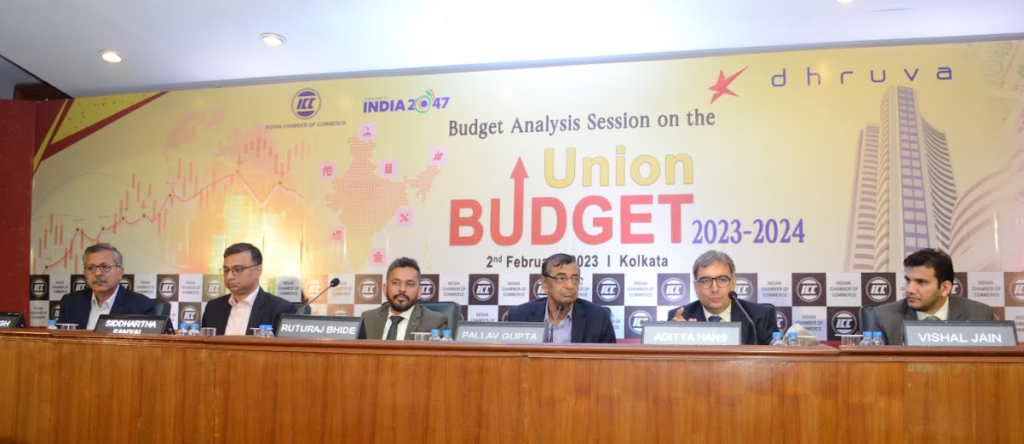ICC conducts Budget Analysis Session 2023
Kolkata, 2nd February 2023: The Indian Chamber of Commerce (ICC) conducted a Budget Analysis session, to discuss and interpret the recently tabled union budget’s impact on both direct and indirect taxes. The session witnessed valuable insights from Mr. Aditya Hans, Partner, Dhruva Advisors LLP, Mr. Ruturaj Bhide, Principal, Dhruva Advisors LLP, Mr. Vishal Jain, Principal, Dhruva Advisors LLP; Mr. Pallav Gupta, Chairman, ICC National Expert Committee on Taxation & Former Head – Taxation, ITC; Mr. Siddhartha Sanyal, Chief Economist & Head of Research, Bandhan Bank; Mr. Pradeep Mitra, General Manager, Finance-Tax, TATA SONS (P) LTD.; Mr. Vijay Bhupatray Pandya, Head, Taxation, TATA Consultancy Services Limited; Mr. Simachal Mohanty, Head-Global Taxation, Dr. REDDY’s Laboratories Limited; Mr. Debashish Mukherjee, Head-Accounts, Mjunction Services Limited; Dr. Rajeev Singh, Director General, ICC.

While delivering the welcome speech, the Director General, of ICC, Dr. Rajeev Singh, said “We stand amidst geo-political problems, recession, climate change, etc. Thus the budget proposed for the current scenario can be considered very forward-looking as a whole. Our government has tried to focus on infrastructural development, green power, and making the local markets more accessible. The new taxation policy has called out several changes to the earlier years. This time our Chamber and audience are expecting to have a more polished economic situation and face the challenge rigidly.”
Commenting on structural highlights of the budget session, Mr. Aditya Hans, Partner, Dhruva Advisors LLP, said “This time the budget has given fiscal stimuli, focused on fiscal discipline and control in inflation but it might have a very less impact on the expected recession in 2023-24. The government has tried to implement several tax amendments encouraging investments to facilitate ease-of-doing business by improving the provisions in the business sectors, rationalisation of certain provisions, and widening the tax space to allow people to have more money out of such taxation policy and providing tax certainty which has a very positive outlook for the economy. The budget lacked clarity on the manufacturing sector. It has an impractical approach, which the government must keep a good eye on. I believe that the ICC will be taking the necessary initiatives to ideate this path to our government. This ideology is with a belief that when we have provisions we must utilise it. The government is excited about startups, unicorn races, and digital developments but that must not hinder the vital necessities of our country’s economy.”
Commenting on the key highlights of the budget, Mr. Siddhartha Sanyal, Chief Economist, Head of Research, Bandhan Bank, said “One primary aspect of this budget is after the reduction of Covid -the government and private organizations are now able to focus on long term policies. We could understand from the budget that words like the development of infrastructure, green push, climate concerns, and sustainability have been taken into consideration. The initiative also marks an improvement in the farming sector. Certainly, this budget can be considered a balanced one, focusing on the broad structures and construction. The budget did not reflect any compulsion over the 2024 Lok Sabha elections and has brought a very balanced backdrop. It is believed to be ready to face the recession, if any, in the upcoming year. The budget highlights the fall of Global inflation and GDP growth is assumed to be 10.5 percent in the next fiscal year. Capex plans constructed by the government have positive assumptions as it immensely contributes to railways, ports transportation and especially infrastructural development. The Budget has mainly focused on the MISHTI scheme which allows states to invest in poor areas and make efforts to develop the space. This budget can prove to be a balanced approach that will keep amending with time.”
Commenting on indirect tax policy, Mr. Ruturaj Bhide, Principal, Dhruva Advisors LLP, said “Customs have incurred the validity period of two years for condition exemption notification imposing on free preferential trade agreements, schemes under foreign trade policy, also on imports and exports. Solar power projects have been excluded from the project import schemes and there has been more emphasis on custom duty rates on domestic manufacturing and green energy. This budget has been a relief in providing fully exempt supplies from obtaining GST registration, withstanding compulsory registration provision. There will be no refund available for the tax payment on sales practices. The monetary threshold for launching prosecution under GST has been proposed to be increased from Rs. 1 crore to Rs. 2 crore. Composition schemes have been extended to the taxpayers dealing with E-commerce. The government has imposed online information and data retrieval services to include services that involve any level of human intervention or automation. This new policy will be rightly affecting our trading system to contribute to our country’s economy.”
Commenting on the direct tax policy, Mr. Vishal Jain, Principal, Dhruva Advisors LLP, said “This time our government has worked on the tax policy giving a limit of rebate which has increased to Rs. 7 lakhs. The maximum surge has been restricted to under 25 percent in this regime and has dropped from 37 percent. On personal taxation, there has been a deduction from eligible capital gains in residential programs. There will be a receipt under the insurance policy with an aggregate premium above Rs. 50,000 which will be taxable under other sources. In pre-requisite accommodation, the computed mechanism will be provided with the existing salary. There is a relief for the startups as the time period for the losses incurred by them has increased from 7 years to 10 years. The cost of acquisition of any self-generated intangible asset has not been taken into consideration. Conversion of gold into electronic gold receipt has been done which would exempt the levy of capital gain tax. There is an increase in threshold limits to avail of the presumed taxation schemes. The turnover threshold is Rs. 3 crores for small businesses and Rs. 75 lahks for professionals. This taxation policy will have a great impact on the small-scale business sector.”
Commenting on the taxation policy and return benefits, Mr. Pradeep Mitra, General Manager, Finance-Tax, TATA SONS (P) LTD, said “Incentivising the expenses based on individual mindset being, one knows that accreditation to income tax, small investments, provident fund, and incentives have not been distributed by the government. There has been a policy on tax reduction and many have accepted this initiative as there would be no major changes that will affect an individual on such disincentivizing in small savings and investments. So, to claim such incentives we first need to file our returns only then we are going to get settled with circulation. There should have been a proper roadmap to implement such taxation policy.”
Commenting on the new taxation policy, Mr. Vijay Bhupatray Pandya, Head, of Taxation, TATA Consultancy Services Limited, said “In case of long-term policies we need to understand the importance of incentives to bring back the money and contribute to our market. There should be constant cash circulation at both government and public levels to secure the future of our economy. The budget needs to have a more polished approach rather than only focusing on digitisation and physical infrastructural development.”
Commenting on the taxation policy, Mr. Simachal Mohanty, Head-Global, Taxation, Dr. REDDY’s Laboratories Limited, said “In this budget session, personal tax has taken over corporate tax. Having said that, there has been a compensating effect as well through insurance policies. It has spoken of deduction and live encashment taking place parallel. So there has been a compensating effect by our finance minister. Strictly there would be a chunk of savings inclined to large surcharges. On a net basis,I would say there is a benefit for an individual as well as the elite population. This budget should have mainly focused on increasing the encashment amount and involvement of farmers in research and developmental policy.”
Commenting on the budget in domestic areas, Mr. Debashish Mukherjee, Head-Accounts, Mjunction Services Limited, said “According to this budget, the government is planning to increase the domestic demand. The government is working on the local levels and trying to push organisations through incentives and other aids to put a surge in domestic demands. This will lead to the push of small sectors and encourage them to invest in such a mechanism. This is the basic thrust of our budget.”
While delivering the closing note, Chairman, of ICC National Expert Committee on Taxation & Former Head – Of taxation, ITC, Mr. Pallav Gupta, said “The taxation subject is extremely vast and complex. The budget shows so many amendments that it becomes difficult to cover all sections. I realise all these custom duties, excise duty, income tax, etc. are constantly revising every month and only during the budget it gets shape. It is certain that this budget may also go through several further changes and tax practitioners should be thankful to the government for practicing different tax policies every year. There is always a slippage in these tax policies. There is a need for good research by the government to construct a concrete policy for the betterment of our country’s economy.”
